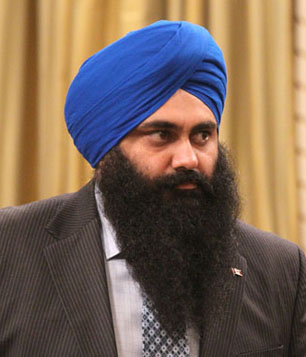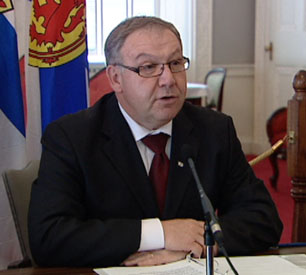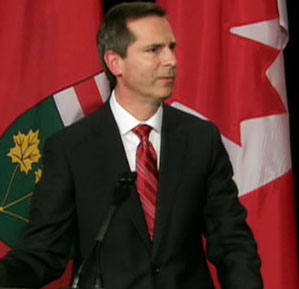One dim light in the dark forest of Canadian Senate reform .. at least Jean Charest’s Quebec is NOT “objecting to modernizing the Senate”?
Jun 1st, 2011 | By Randall White | Category: In Brief
BC Premier Christy Clark says Vancouver Canucks will take the 2011 Stanley Cup in five games. And, oh yeah, she thinks the Senate probably should be abolished, but that’s unlikely, and at least an elected Senate would be more legitimate to the Canadian people, etc. Whatever, she is without any doubt the cutest first minister in Canada today, provincially or federally, of course.
[UPDATED]. The Globe and Mail’s online poll on “Is the Conservative Party committed to reforming the Senate?” (38% Yes and 62% No, as of today) could be read as suggesting that only those who voted for Mr. Harper’s party on May 2 still believe in its public commitments on this front.
Yet according to John Ibbitson this past Sunday: “The Conservatives will introduce legislation in June that will bring about the most important changes to the Senate since Confederation, just weeks after they were criticized for appointing three Tory faithful to the Red Chamber … One new bill will impose term limits on all senators, including those already in the chamber; the other will allow provinces to hold elections for senators whenever seats become available.”
On Monday, however, John Ibbitson and Rhéal Séguin reported that: “If Stephen Harper insists on moving ahead with Senate reform, he can expect the Quebec government to fight him all the way to the Supreme Court … Others warn that the Prime Minister’s plan to permit elected senators who would serve fixed terms could create a patchwork of provincial rules that might also be struck down by the courts.”
So … you might guess that in this case merely having a majority of seats in the Canadian House of Commons in Ottawa at last (and in the still unreformed Senate of Canada too, of course – though see the UPDATE at the very end of this piece for the latest on this front) is not going to let PM Harper get away with doing exactly as he pleases.

Tim Uppal, minister of state for democratic reform, said concerns voiced by some provincial governments about the Harper government's Senate reform plans are baseless. Photograph by: Pat McGrath, The Ottawa Citizen.
Feelings of this sort might also be stiffened by yesterday’s Canadian Press report that: “Three provinces are advising Prime Minister Stephen Harper to forget about reforming the Senate and simply abolish the upper chamber … Ontario, British Columbia and Nova Scotia say instead of introducing legislation to set term limits for senators and allow for elections, the so-called chamber of sober second thought should be closed forever … At the same time, Quebec is warning it will go to court if necessary to stop Harper from unilaterally reforming the Senate …”
And yet again, before giving in to utter cynicism and despair on the prospects for serious change at last in the unreformed Senate of Canada, note the very last part of yesterday’s first Canadian Press sentence on la belle province (aka “not a province like the others”) : “Quebec is warning it will go to court if necessary to stop Harper from unilaterally reforming the Senate, but unlike the three other provinces, it does not want the Senate abolished.” (Italics added, of course.)
1. Senate reform that finally helps entrench the founding Canadian commitment to the survival and vigour of the French-speaking majority in Quebec

Quebec Intergovernmental Affairs Minister Pierre Moreau says that the federal government alone cannot reform the Senate, but that in taking this position Quebec is not objecting to modernizing the institution.
For greater clarity, the Canadian Press report goes on: “On Monday, Quebec Intergovernmental Affairs Minister Pierre Moreau said that the federal government alone cannot reform the Senate, adding it must be done through a constitutional amendment, approved by at least seven provinces” [that also represent at least 50% of the Canada-wide population]. But: “Moreau said Quebec was not objecting to modernizing the Senate, but has held the same position that any changes should go through a constitutional amendment for more than 20 years.”
For those of us who still believe in some realistic version of Senate reform to bolster various brands of regional representation for a stronger Canadian future, it seems possible to detect two grounds for at least some slight optimism in this Canadian Press report.
The first is that M. Moreau’s concern to underline how at least Jean Charest’s Liberal Government of Quebec does not want the Senate abolished, and does not object to “modernizing the Senate,” could be read as evidence that some significant strand of Quebec opinion is open to the prospect of a reformed Senate of Canada as the “logical place in which to entrench legislative or parliamentary expression of the founding Canadian commitment to the survival and vigour of the French-speaking majority in Quebec.”
And if there is anything at all to this kind of reading, that is certainly good news for those of us who believe that a reformed provincial representation concept which makes sense for Quebec – as well as the other demographically large provinces of Canada (Ontario, BC, and Alberta) – is the key to any serious and workable version of Senate reform, of a sort that could indeed help strengthen the long-term Canadian future, in several much-needed respects.

Jean Chretien (l) speaks with Quebec Premier Jean Charest (r) during the opening speeches of the InterAction Council meeting at the National Assembly in Quebec City, May 29, 2011.
This does involve giving up on the one of the “Es” in the so-called Triple E Senate reform concept that promises equal provincial representation, as in Australia and the United States. But Canada is not like either Australia or the United States, in some crucial ways.
Similarly, stronger and more effective regional representation in the Canadian federal parliament does not have to mean equal Senate representation for each province – from Prince Edward Island with 143,481 people, to Ontario with 13,282,444 people, and including Quebec with 7,942,983 people, the majority of whom speak French as their mother tongue. Or, if you like, just how much practical sense does the Triple E concept make, in a situation where equal provincial representation would mean that the six smallest provinces, representing less than 14% of the total cross-Canada population, have a permanent reformed Senate majority?
2. Christy Clark’s Pacific Coast concept of abolishing the Senate if necessary but not necessarily abolishing Senate reform?

Nova Scotia Premier Darrell Dexter is one of three provincial premiers advising Prime Minister Stephen Harper to simply abolish the Canadian Senate. (CBC).
The second ground for at least some slight optimism in the latest Canadian Press Senate reform report turns around some qualification in the views of BC Liberal Premier Christy Clark, on the alternative of just abolishing the alleged Canadian chamber of “sober second thought,” modelled a little too much on the British House of Lords, back in the later 19th century.
Like Ontario Liberal Premier Dalton McGuinty and Nova Scotia NDP Premier Darrell Dexter, Ms. Clark says she believes “the best way to fix the Senate is to abolish it.” But she also believes that is “unlikely to happen,” and that “an elected Senate” of the sort Mr. Harper will be trying to encourage with his bill that “will allow provinces to hold elections for senators whenever seats become available” would “at least be legitimate” in the eyes of the Canadian people.

Ontario Premier Dalton McGuinty also just wants to see the unreformed Senate of Canada abolished. (CTV).
This Mackenzie King rhetoric on Premier Clark’s part, about abolishing the Senate if necessary but not necessarily abolishing Senate reform, could also be read as evidence that a BC provincial government might finally be prepared to side with the angels, on a reformed Senate concept of provincial representation which makes sense for Quebec – as well as the other demographically large provinces of Canada.
Whatever the constitutional truth may be about Mr. Harper’s current two “step by step” Senate reform bills (and, for what it’s worth, I think myself that they are both quite within the unilateral authority of the federal Parliament), any ultimate Senate reform concept that changes current provincial representation in the so-called “upper house” certainly will require a constitutional amendment, backed by seven provinces representing at least 50% of the Canada-wide population.

BC Premier Christy Clark and Stephen Harper don't exactly see eye-to-eye on Senate reform. But does that mean she wouldn’t back a reformed Senate concept of provincial representation which makes sense for Quebec and the other demographically large provinces of Canada, a little further down the road? Photo: Jason Ransom/PMO.
On all the current numbers, BC, Ontario, and Nova Scotia – which together account for not quite 55% of the Canada-wide population – could block any constitutional amendment on a reformed Senate concept of provincial representation which makes sense for Quebec – as well as the other demographically large provinces of Canada. But Ontario and Nova Scotia by themselves could not! So … is Premier Clark at least trying to hold some future Senate reform door open in a more positive and progressive direction?
Of course, of course, etc, etc … you can easily enough say that all this is just grasping at straws. But when you are looking for any kind of light in the dark forest of Canadian Senate reform at the moment, straws are better than nothing at all.
Mr. Harper himself may not really care if his two new bills (which have already failed in the 39th and 40th Parliaments of Canada) make it through the 41st Parliament at last, only to be rebuffed by the courts and recalcitrant provincial governments. He may just be going through the motions to mollify an important part of his own political base. Yet as Professor David Smith at the University of Saskatchewan has told John Ibbitson and Rhéal Séguin (echoing Premier Clark, in some degree), the Harper majority Conservative bill to at least get started on some version of Senate elections just might “attract broad public support” among the mere Canadian people.
Professor Smith goes on: “If there’s any agreement on the Senate, it’s that people are not happy with an appointed Senate … People don’t like it. It doesn’t have a democratic base. This would be a step to meet that objection. And it would be a big step.” And, in spite of everything else, this actually could help build a stronger Canadian future – especially if, somewhat further down the road, there is also some serious prospect of further Senate reform, based on a concept of provincial representation which entrenches the founding Canadian commitment to the survival and vigour of the French-speaking majority in Quebec.
UPDATE – “Wake me when it’s over”?: Well wait a minute, this just in, from the pages of the Montreal Gazette, 7:02 PM ET: “Conservative senators balking at Senate reform agenda: sources.”
Or, more exactly: “Prime Minister Stephen Harper has a majority in the Senate but he may not have the numbers to push through the reforms he planned for the Red Chamber, Postmedia News has learned … That, say sources, is the real reason the government is showing signs it is willing to compromise by extending its proposed term limits for senators from eight years to 10 or 12, and promising a full study on the election of senators rather than the quick passage of its Senate reform package bills.”
The prospect that this scenario may prove accurate is enough to make me personally start tearing my hair out – except at my age I don’t have all that much hair left, and I’d like to keep what I have. The most sensible reaction if Mr. Harper’s own stacked Conservative majority in the present unreformed Senate of Canada were to reject his two Senate reform bills would be to collapse on the softest rug in your house (or apartment, office, recreation centre, etc), in vast heaps of uncontrollable laughter.
If something of this sort is what happens, then the next four years of Harper Conservative majority government in Ottawa certainly will be beginning not with a bang but a whimper. And the only rational strategy for following Canadian federal politics between now and October 19, 2015 really will be “wake me when it’s over.”


What will happen with the Ottawa Senators?